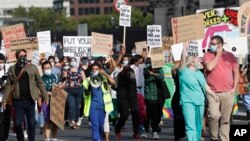The four-day walkout, which began at 0600 GMT, follows months of strikes by other public and private sector staff as inflation sparks the UK's worst cost-of-living crisis in a generation.
The action by so-called junior doctors - physicians who are not senior specialists but who may still years of experience - comes after a three-day stoppage last month and several strikes by nurses.
It threatens to be the most serious walkout yet and lead to the cancellation of hundreds of thousands of appointments.
The strike affects the NHS in England but not in the UK's other regions.
They are demanding a pay rise of 35 percent, which they say is needed to help make up for more than a decade of salary cuts in real terms.
They also argue pandemic backlogs coupled with staff shortages are massively increasing workloads, endangering patients.
"We have had a massive (pay) cut and we are filling more gaps because people are leaving," said junior doctor Katrina Forsyth, who added she sometimes wept after shifts.
"It's becoming less safe for patients," she said from a picket line after finishing a night shift at St. Thomas' Hospital in London.
The government maintains the pay request is unaffordable, as ministers try to dampen wage demands across the public sector amid stagnant growth and high inflation.
"I hoped to begin formal pay negotiations with the BMA (doctors' union) last month but its demand for a 35 percent pay rise is unreasonable," said Health Secretary Steve Barclay.
Barclay struck a deal last month with unions representing various health workers, including nurses, to increase pay by five percent.
Union members are currently voting on whether to accept it.
However, the deal does not cover junior doctors, who comprise around half of all NHS doctors, according to official figures.
Phil Sutcliffe, 75, of south London, was among those affected, with his cancer check-up appointment postponed to next month.
"These doctors do the most fantastic job for very modest pay... so the government needs to get to the negotiating table and start talking," he said.




